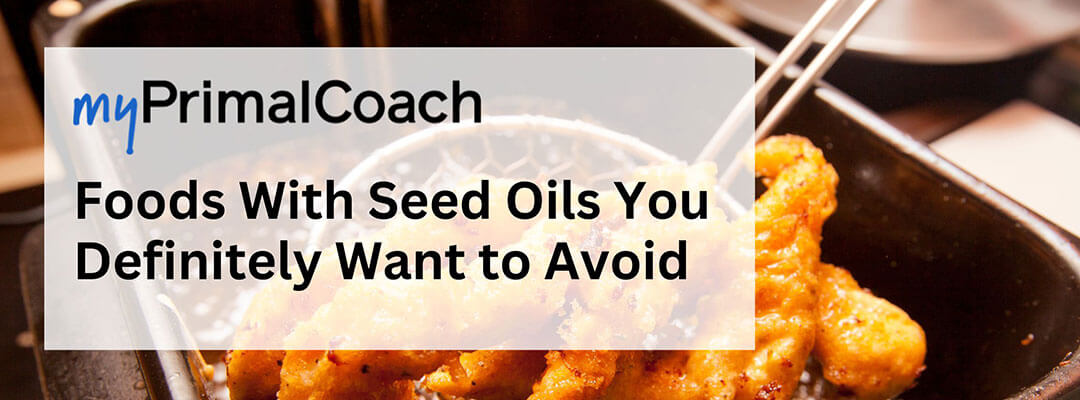Seed oils are everywhere. They’re widely used as the main cooking fat in restaurants. They’re also habitually called for in recipes. Even when you try your best to avoid them, foods with seed oils can still sneak their way into your diet.

So why should we avoid them? For starters, there are many known health risks associated with consuming seed oils, particularly those high in omega-6 fatty acids. And for these reasons, foods with seed oils are not part of a primally-aligned diet.
Limiting seed oil consumption is easy if you cook at home and use substitute fats for recipes. But if you’re looking to avoid consuming these oils while eating any convenience foods and snacks, knowing where they might be hiding and what to look out for is helpful.
Before diving into the top foods with common seed oils you want to avoid, let’s first define what they are, how they are made, and why they’re not the healthiest oil choice.
What Are Seed Oils?
Seed oils are common vegetable oils made from the whole seeds of a plant. They are often used for cooking, in processed and packaged foods, and as a base for sauces and salad dressings. Many people consider seed oils to be healthier than animal fats and other oils due to their lower saturated fat content. However, most seed oils are highly processed and may contain harmful chemicals that damage our health.
Seed oils have been used for thousands of years and have played an essential role in food and agriculture. The ancient Egyptians used castor oil as a fuel for lamps and for its laxative properties. Seed oils have been used in cooking, medicine, and even cosmetics throughout history.
The industrialization of seed oil production began in the early 20th century. New methods for pressing and extracting the oil from seeds with solvents led to the mass production of seed oils, especially canola oil and soybean oil, which are now household staples and abundant in processed foods. According to the American Journal of Clinical Nutrition, soybean oil is the most popular seed oil in the United States, and its use has increased one thousand times over since the early 1900s.
How Are Seed Oils Made?
Industrial seed oils are made using a combination of both mechanical and chemical processes. The seeds are first cleaned, dried, and then crushed, usually with an oil mill to release the oil. The oil is then separated from the seed by pressing or extracting it with solvents.
Mechanical pressing involves using a machine to apply pressure and discharge the oil from the seed. This method is commonly used for small-scale production, while chemical solvents are often used to extract the oil from the seeds for large-scale production.
Once extracted, the oil is processed with bleaching and deodorizing to remove impurities and prolong its shelf life. This refining process can also remove important nutrients and antioxidants from the oil.
Why Are Seed Oils Harmful?
While they may be considered a healthy choice, seed oils can be harmful to our health. They are high in omega-6 fatty acids, which can lead to inflammation in the body when consumed in large amounts. Chronic inflammation has been linked to a range of health issues, including heart disease, obesity, and cancer. Many seed oils are also highly processed, as explained above. This can lead to the formation of damaging trans fats and oxidation.
The standard Western diet contains an abundance of omega-6-rich vegetable oils and is low in omega-3 fatty acids—and most national dietary guidelines like to keep it that way. Consumers who eat a lot of packaged foods or out at restaurants or fast-casual establishments are likely to eat a mostly soybean oil diet. All omega-6 fatty acids are not inherently unhealthy. It is about the ratio between the two essential fatty acids and how they are processed. A dietary intake that contains a healthy balance of omega-6 to omega-3 fatty acids is ideal. Most people’s diet contains simply too much omega-6.
Seed oils have been linked to a whole host of health issues. A cohort study showed that substituting linoleic acid for saturated fats leads to a higher mortality rate and higher cardiovascular disease. Inflammatory diseases, including autoimmunity, Alzheimer’s disease, and non-alcoholic fatty liver disease, have all been tied to seed oil consumption as well.
Foods With Seed Oils to Avoid
Seed oils can be found in many foods that are marketed as healthy. Here are some popular edible oils to keep an eye out for while navigating the grocery store aisles:
- Condiments such as hot sauce, mayonnaise, ketchup, and mustard
- Salad dressings
- Sauces such as teriyaki, barbecue, and pasta sauce
- Bottled marinades
- Pre-marinated meats and poultry
- Canned tuna and seafood
- Hummus
- Protein bars
- Granola bars
- Chips
- Popcorn
- Crackers
- Cookies
- Breads
- Tortillas and wraps
- Canned beans
- Vegetable and bone broths and stocks
- Cereal and granolas
- Frozen foods, including meals and vegetables
- Nut and seed butters
- Coffee creamers
- Yogurt
- Packaged cheese, including non-dairy cheeses
- Ice cream, including non-dairy varieties
What to Look Out For on Labels:
The following oils often pop up in ultra-processed and processed foods. Check the ingredient list for plant oils that will increase your linoleic acid consumption, an omega-6:
- Grape seed oil
- Sunflower oil
- Rice bran oil
- Corn oils
- Canola oil
- Soy oil
- Cottonseed oil
- Peanut oil
- Trans fatty acids
- Hydrogenated oils
- Partially hydrogenated oils
Oils for Health-conscious Consumers to Look for Instead Include:
- Avocado oil
- Almond oil
- Olive oil
- Oil from chia seeds, sesame seeds, and flax seeds
- Pumpkin seed oil (rich in alpha-linolenic acid, an omega-3)
- Wheat germ oil
Summary
Seed oils run rampant in the food industry mostly because they are cheaper and yield higher margins, and have been believed to be healthier than animal fats and saturated fats. However, they are not. The best way to avoid foods with seed oils is to consume unprocessed whole foods that you prepare yourself and to be diligent about checking labels for any offenders.
Whether you are looking for guidance on avoiding foods with seed oils, or you want to clean up your diet, avoid added sugars, and become more primally-aligned, a myPrimalCoach can help you get started.

